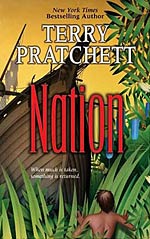
![]() Tar Daddoo
Tar Daddoo
3/3/2013
![]()
A third of the way through Nation, I wondered when it would get started. Another third of the way through, I wondered whether it was a fantasy. When I finished, I wished it were all true.
If you are familiar with Pratchett's Discworld series, then you will find Nation quite different. It is not as zany or even preposterous; it has fewer comic scenes and is less pun-filled. I suppose if these are the only things that draw you to Pratchett, then you might not like Nation. Having said that, if part of what draws you to Pratchett is solid story-telling, interesting characters, and an irreverent perspective, then consider reading Nation. It is a different kind of a ride, but I thoroughly enjoyed it.
As I indicated, the story starts slowly. Pratchett takes the time to introduce his main characters and let us appreciate their predicament. If you are like me you will be constantly watching for the fantasy or science fiction angle. There is very little of it. The world is a familiar nineteenth century one with some names and characters changed. It is perhaps an alternate universe, but you do not need to know or care about that unless you are especially finicky about historical accuracy. There is some suggestion of communicating with spirits, but there is no commitment to this as a real phenomenon and we are free to believe it is simply a way of thinking through a problem.
Eventually the story does start moving, even accelerating, towards a quite gratifying climax and then conclusion. Ultimately, it is a story about what good people do when they care about others and what bad people do when they only care about themselves. But it is also a story about lies, and shared belief, and duty, and …
I suppose one final cautionary note is warranted. My guess is that most people would consider Nation a story for youngsters. In format, theme, and approach to story-telling, it is more in keeping with Pratchett's The Amazing Maurice and His Educated Rodents or the Tiffany Aching series. These books are clearly intended to be accessible to younger readers and I believe they succeed in that regard.
Nevertheless, I am over sixty and I find all these stories to be among Pratchett's best. Pratchett's approach to writing for children does not lead him to trivialize or abandon tough themes. He still insists that we think. In my opinion, the demands of writing for children lead him to hone his prose and avoid stream-of-consciousness. The result is great stories for adults that children can enjoy as well.
Tar Daddoo